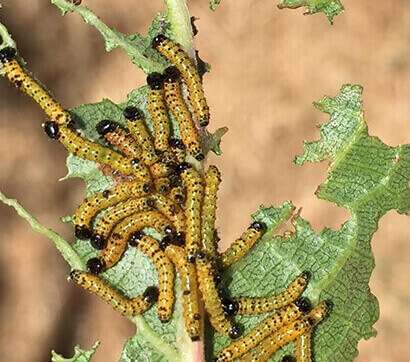Caterpillar Control: How to Save Your Trees From Caterpillar InfestationsPosted by kelis myzer on September 29th, 2022 Caterpillar infestations can be a pain in the neck, and caterpillar control is one of the first things gardeners and farmers alike need to take care of. These pests are prone to be present in any place with an abundance of plants to devour. They chew on leaves, roots, stems, roots, buds, fruits, flowers, and practically anything else that is attached to a plant.
Caterpillar control is important regardless of where you live because caterpillars can thrive in all kinds of places, be it warm, cold, moist, or dry. Different types of caterpillars thrive in different places, making them a universal problem no matter where you are. They do have a lot of natural predators, but their sheer numbers make it difficult to control them even if these predators are around. Types of Caterpillars Cabbage Loppers: These small clitters have stripes on their back and are pale green. They are a massive headache to agriculture as they like consuming leafy vegetables like cabbages, cauliflowers, lettuce and kale.
Horn worms: These have horns at the end of their bodies, and have an affinity toward tomatoes, eggplants, pepper plants and potatoes. They are also fast, which means they can devastate your plants in a very short time.
Cutworms: These are one of the most dangerous caterpillars from an agricultural perspective because they have an affinity toward baby saplings. They also hide during the day and are active during the night, making them hard to detect. They curl around the base of your sapling, then cut the stem, destroying the sapling in the process.
Armyworms: These are pretty harmless, unless you like to keep a lush green backyard full of grass. They mainly devour grasses.
Corn earworms: These caterpillars eat the white silk found in corn crops, and can remain in the corn during harvest, shocking consumers who buy your corn. Their larvae can bore into the tips of the corn cobs, making them uneatable.
What makes caterpillars so dangerous? While they might seem mostly harmless, anyone who is into agriculture or gardening knows what a nuisance they can be, Their colors are often designed to either scare off predators or for camouflage, making it difficult to find them, Some caterpillars only work during the night, making pest control exceedingly difficult. They can make crops uneatable and destroy your garden, sometimes preventing your saplings from growing into full-fledged plants. They can be dangerous for your health as well if they leave their larvae on the veggies they devour.
What are your options? The easiest method for eliminating caterpillars would be insecticides. These chemicals can immediately kill them and render them completely harmless, allowing your plants to thrive. However, there is a major caveat. Insecticides will also end up killing other insects that might be helpful to you, like bees that act as pollinators and other insects that destroy smaller pests while presenting no harm to your plants. These insecticides can also run the soil if used in excess. While these are the best immediate solutions, they are rarely sustainable.
If you have a smaller garden, you can try manually removing caterpillars from your plants. You can look for anything that looks suspiciously like larvae and remove them as well. However, this can be too time-consuming if you have a bigger patch of land.
Some caterpillars also respond to herbal or homemade insecticides, like neem oil. This is less harmful than using insecticides and does not do damage to the soil or the plants.
However, in case of a massive infestation, your best bet is to call for professionals. A clear and detailed assessment of the situation can help you make better decisions, and you can decide for yourself what solution you prefer. Various Plant healthcare providers and pest control services can offer perfectly healthy solutions which are preferable to using insecticides. You can also opt for less abrasive and more organically made insecticides to minimize damage. Like it? Share it!More by this author |



